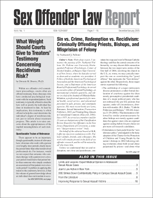Truth-Detection Devices and Victims of Sexual Violence
Author: Jonathan Kurland, J.D..
Source: Volume 22, Number 05, August/September 2021 , pp.65-70(6)

< previous article |next article > |return to table of contents
Abstract:
Jonathon Kurland provides a brief overview on the history and modern forms of truth-detection devices and discusses how the earliest concerns about their reliability and limitations continue to be valid today. The article discusses why truth-detection devices are inappropriate and how, in many jurisdictions, they are prohibited from being used when interviewing victims of sexual violence. Despite the reliability concerns, truth-detection devices remain in wide use and are a potentially useful tool during questioning of suspects. Kurland’s analysis here is accompanied by a sidebar that surveys the history of lie-detection devices and their “mind-body link” theoretical foundations as advanced by Moulton Marston, who developed an early version of the polygraph that detected changes in a subject’s blood pressure when questions triggered a physiological response associated with the fear, dissonance, or emotional disquiet of lying.Keywords: Frye v. United States; Polygraphs; Voice Stress Analyzers (VSAs)
Affiliations:
1: Aequitas.